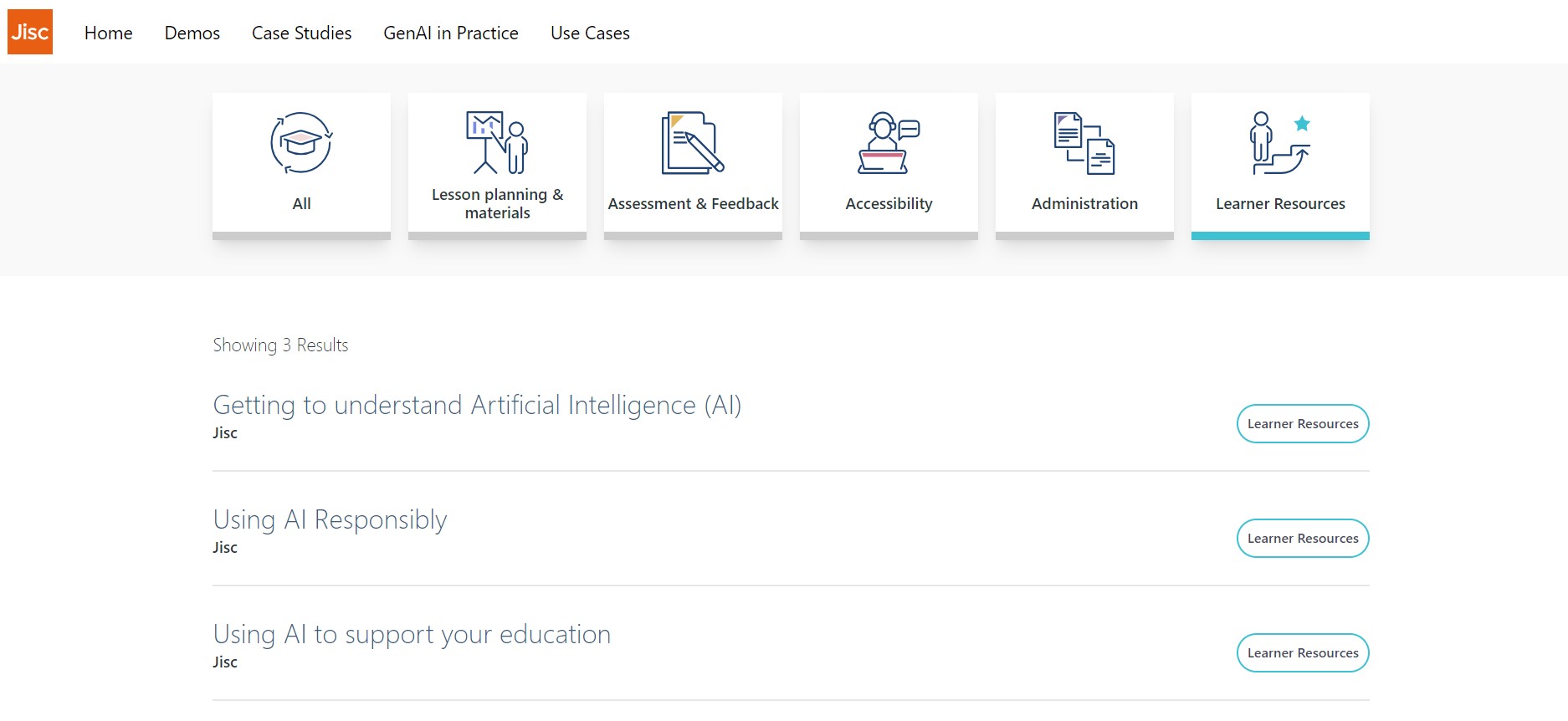 We are pleased to share that we’ve finished creating a set of resources for Further Education (FE) to help build learners’ AI literacy. This has been a team effort from our working group, who helped identify and review the necessary topics.
We are pleased to share that we’ve finished creating a set of resources for Further Education (FE) to help build learners’ AI literacy. This has been a team effort from our working group, who helped identify and review the necessary topics.
What we’ve focused on
The learner resources cover a range of key areas in AI literacy. These include:
- Getting to know Artificial Intelligence (AI) – Provides an introduction to AI technology, a glossary covering key terms we use when talking about AI, how AI systems are created, and their benefits and limitations for users.
- Using AI responsibly – Offers an introduction to using AI tools and systems responsibly, with practical advice for learners using AI to support their studies, while considering the wider ethical issues around AI technology.
- Using AI to support your education – Provides practical examples of how learners can use AI tools to support their education. Each document includes a scenario demonstrating AI as a learning aid, not a replacement, and features suggested tools, prompts, and tips. Institutions can customise the tools section based on their own approved resources, and feedback on the format is welcomed for future development.
Throughout the development of these practical examples, we aimed to consider the broader skills learners could develop when using generative AI. The resources also include suggested assessment activities, and over time, we will add more resources and video demonstrations of the practical tasks.
You can explore and download the resources we’ve created in our AI Explorer Resource Hub.
How could these resources be used?
These learner resources have been created for FE institutions to use and adapt as needed. You may wish to download and adjust them to suit your institution, for example creating a VLE course focused on AI literacy for learners or incorporating some of the activities into tutorials. The materials are designed to be flexible and adaptable.
To accompany these resources, we have produced Generative AI Literacy for Further Education Learners: Core Level as part of a separate working group focused on defining AI literacy levels for learners. This guide helps learners build a solid foundation in understanding generative AI. Learners can use these resources to gain knowledge about AI and then self-assess against the core level to identify areas for further development in their AI literacy journey.
The resources are now ready to be shared with learners, and we’re excited to see how they’ll be used so please send us feedback to AI@jisc.ac.uk.
A big thank you to everyone who contributed to this working group.
Contributors:
Adam Dwight – City of Wolverhampton College
Adrian Emerson – Bury College
Bryony Evett – Coleg Sir Gar
Daniel Christiansen – Heart of Yorkshire Educational Group
David Wise – South Thames College Group
Graham Taylor – Tyne Coast College
Jonathan Mann – Blackpool and The Fylde College
Judy Kay – Coventry College
Katy Townsend – Saint Francis Xavier Sixth Form College
Kimberley Llewellyn – Coleg Gwent
Mafalda Giudice – New City College London
Mine Tana – Barnet and Southgate College
Namaan Mohammed – Hopwood Hall College
Nigel Holloway – Coleg Cambria
Sharon Hargreaves – Blackburn College
Viorica Lucuta – New City College London
Helen Nicolson – Jisc
Paddy Shepperd – Jisc
Find out more by visiting our Artificial Intelligence page to view publications and resources, join us for events and discover what AI has to offer through our range of interactive online demos.
For regular updates from the team sign up to our mailing list.
Get in touch with the team directly at AI@jisc.ac.uk
